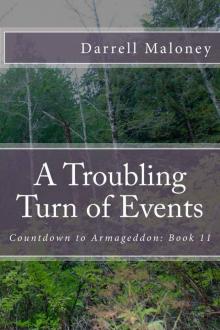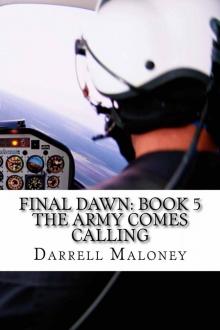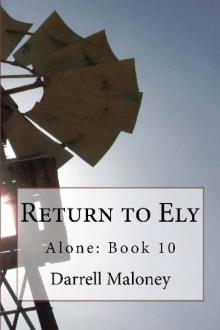- Home
- Darrell Maloney
Rest in Peace Page 4
Rest in Peace Read online
Page 4
The young captain, though, was a bit shy and more than a little self-conscious about her weight.
“Yes, sir. I’m fine… I come from a family… well, thin people run in my family. I’m getting plenty to eat.”
The general realized his words had been a bit harsh, but couldn’t take them back.
Generals never ever apologize.
They just change the subject.
“Well then, Captain Krebbs. What can I do for you?”
“Actually, sir, I’m here to help you.”
“Oh? How so?”
“Captain Edwards explained to me that you never had the chance to install security cameras on the outside of your bunker.
“I’ve got a team of men taking care of that, even as we speak.
“By the end of the day tomorrow you’ll have a dozen cameras, giving you a view of several hundred yards in all directions.
“But my people will need to run some one-inch conduit through one of your ventilation pipes. They’ll run fiber-optic cable into the bunker to attach to your monitors.”
“Well, now. That’s quite neighborly of you, Captain. Thank you.”
“No need to thank us, sir. That’s what we do.
“I do need some assistance from you, though.”
“Like what?”
“I’ll need to meet with your building manager. He’ll need to tell us where he’ll place his monitors and measure the distance from the monitors to the vent so we know how much cable to run.
“He’ll also need to tell us whether he has a sufficient number of monitors. If he doesn’t we can provide some.
“Lastly, if he doesn’t have the technical expertise to set up and program the monitors we’ll be happy to help.”
Mannix was impressed.
He got on his radio.
“Sergeant Holt, are you available?”
The sergeant’s voice came over the radio almost instantaneously, as though he were waiting for the general to call.
“Yes, sir. Be there in two minutes. Maybe three.”
The sergeant didn’t ask who was calling him.
He didn’t have to ask.
Mannix had a booming and very distinctive voice.
“You know what’s nice about being a general?” he mused to the pair of captains.
Captain Edwards assumed there were many nice things about being a general. But he’d play Mannix’s silly game.
“No, sir. What’s that?”
“Any time I ask if someone is available they immediately are.
“It wouldn’t matter whether Sergeant Holt was sitting on the toilet, making love to his wife or sound asleep.
“Any time I call, whoever I call will immediately drop what they’re doing, whatever it is, and come running.
“That’s what’s nice about being a general.”
Captain Krebbs asked, “Is Sergeant Holt also your point man for communications projects?”
“Yes indeed he is. What do you have in mind?”
“I’ve taken control of the Communications Squadron. It was rather small, and when the Officer-in-Charge and his deputy both deserted their posts the squadron wasn’t capable of functioning. I brought it under the control of my unit.”
“Where did the OIC and his assistant go, exactly?”
“Nobody knows, general. We assume they drove back home, to wherever home might be.”
“Ah, yes. Not an uncommon problem these days. It might be time to court-martial a few deserters at each of my bases. Maybe that’ll serve as a deterrent for others who might be considering the same thing.”
“Might I suggest you wait until after the current freeze is over?”
The general looked at her inquisitively.
She elaborated.
“The snow pack is making it very difficult to get around. Courts martial would require a lot of daily movement for legal teams and panel members, plus we don’t have a stockade or holding cell attached to the legal center.
“The Security Forces would have to transport the accused to and from the brig daily. It’s a distance of about four miles.”
“How high is the snow pack?”
“As of this morning, just over twenty inches.
“Our meteorologists tell me it’s mostly due to an unseasonable storm. If the freeze hadn’t happened it would have been a twenty year flood. All the rivers and streams would have overflowed and we’d all be wading in ankle-high water.
“It would have dissipated within a couple of days. But since the freeze happened, it came down in the form of snow and it’ll be here awhile.”
“What’s your meteorologist’s estimation on how high the snow pack will get?”
“He said it shouldn’t go much higher. At some point the snow’s own weight will begin to pack it down. He said he’d be surprised if it goes much over three feet before the thaw comes.”
“I come from Minnesota. Three feet is nothing.”
“Maybe not if you come from Minnesota, sir. But we’re in south Texas. We don’t get a lot of snow around here. We’ve only got two snow plows and they’ve been running twenty four-seven trying to keep everything clear. If they break down we’ll be in a bit of a tight.
“Also, we ran out of salt and sand the second day of the freeze, and no longer have anything to treat the roads with.”
“Your general recommendation?”
“It’ll get a lot worse before it starts to get better. In the meantime, it’s base policy that all outside movement be mission-essential.”
-11-
At that point Sergeant Steve Holt appeared in the general’s doorway.
“Come in,” Mannix said.
“Captain Krebbs, this is Sergeant Holt. He’ll be your point man for the camera project.”
Holt asked, “Camera project?”
“The good captain is having a work crew install surveillance cameras for us on the outside. They’re going to run cable into one of the air vents.”
“Outstanding, sir. That’ll make security much easier.”
“Yes, it will. Work with her, would you? Give her all the assistance she needs, as well as information on where the cable will end up and how many monitors we’ll need.
“Have Sergeant Willard work with you and tell him once everything is operational I want him to post one of his security people to watch the monitors twenty four seven.”
“Yes, sir.”
General Mannix turned back to Captain Krebbs.
“You asked if Sergeant Holt was our communications guy. What was all that about?”
“Colonel Leatherwood, the new base commander, asked me to talk to you about a hotline from your control center to his office.”
“Is such a thing possible? I thought none of the phones were working anymore.”
“No sir. The cell phones aren’t working because all the carriers have shut down. Our Comm Center is still working for base land lines.”
“How much work would it take to hook us up?”
“Not that much, sir. We’ve got lines that run through the woods just north of here. We can tap into those lines and run weatherproof Cat-5 cable overland. There are no roads to cross so vehicle damage won’t be a problem.
“So it’ll just lay on the top of the snow? Won’t that be a security risk?”
“Not as long as no classified material is discussed on the line. And it won’t lay on top of the snow for long. The way the snow is coming down out there it’ll be covered up in no time at all.”
“In that case, tell Leatherwood I appreciate his offer and would like to have two hotlines installed. One in our security control center and a second in my office.”
“Yes, sir,” Krebbs told him. “I’ll work with Sergeant Holt and we’ll let you know when they’re operational.”
Holt said, “If you’ll follow me, ma’am, I’ll show you where we’ll need the cable dropped.”
The pair turned and walked toward the door until the general stopped them.
“Cap
tain Krebbs?”
“Yes, sir?”
“Before you leave today would you stop back by? I’ve got something I’d like to discuss with you.”
“Of course, sir.”
That left the general alone in his office with Captain Edwards.
“Captain Edwards,” the general began. “What’s the status on the court martial of our two colonels?”
“That was the primary reason I came here today, sir. Other than to bring Captain Krebbs and to introduce you to what she was working on.
“Captain Perry, the Staff Judge Advocate, has come down with what appears to be the flu. The base no longer has the capability of immunizing our personnel, as you can rightly expect.
“The answer, according to the base medical experts, it to isolate those who come down with the flu to the greatest extent possible.
“Captain Perry was planning to come and see you today to brief you, but he’s confined to his quarters by orders of his doctor. He asked me to brief you in his stead.”
“And you’re incapable of carrying the flu virus?”
“I never came into contact with Captain Perry, sir. He briefed me from across the room and wore a paper mask over his mouth and nose.”
“That’s good. The flu, were it to make its way into a confined space such as his bunker, could be devastating.”
“Yes, sir.”
“What did he have to share with me?”
“Major General John Paul Stephens arrived yesterday from Hill Air Force Base. He will preside over the court-martial panel.
“Did he have any trouble getting in?”
“No, sir. We diverted both snow plows to the runway while they were enroute and cleared the snow for them to land.”
“When is he planning to meet with me?”
“That’s up to you, sir. Captain Perry suggested it be soon. The general will need to know what charges you want to bring, and whether you would consider a plea deal. You mentioned your desire to have a tribunal within sixty days, so the sooner they get started the better.
“Captain Perry will not need to be present for your meeting with General Stephens, but he asked me to be present to take notes for him.”
“Very well. See if General Stephens can meet with me tomorrow at ten hundred hours. I’ll block out that time for you.”
“Yes, sir. Anything you want me to convey to Captain Perry?”
“Ask him to send a copy of the Manual for Courts Martial. I’d like to review my role and responsibilities as convening authority.
“Also, make sure the Staff Judge Advocate’s office has put the general up in suitable quarters and is making him comfortable.
“I don’t want any chance of those two not getting a fair trial because the panel president is uncomfortable and grouchy and looking for someone to take it out on.
“Do we have enough senior officers to make up the panel?”
“I don’t know, sir. I believe so. Captain Perry can brief you on the specifics when he’s well, but I believe he said he could seat a general court martial panel with Air Force officers from this area. He’s got several high-ranking colonels over at Randolph he can pick if he can get them over here.”
As he spoke Captain Krebbs appeared in his doorway.
“Very well, Captain. That’ll be all.”
-12-
“Oh, boy! Really?”
“Yes. Really.”
As it turned out, Mark Junior’s request for a rifle for his birthday wasn’t unexpected.
His father Mark had a well-deserved reputation for being a bit scatterbrained.
But he had his moments.
Years before, when he and Hannah were stocking the mine the first time in anticipation of the pending collision of Saris 7, he’d broached the subject with her.
“Honey, I went over the list of weapons and ammo we need to stockpile. Should we include any kids’ weapons?”
“Now why in the world would we need kids’ weapons? We’ve got enough men coming in to handle security. If we get to the point where we need the kids to help defend the mine maybe it’s time to surrender.”
He didn’t know whether she was kidding, but this was a serious question.
He didn’t want to just drop it.
“Honey, I’m serious. I’m not advocating we use the kids to help defend the mine. But it’ll be a new world once it thaws out. A more dangerous one, where everyone will need to know how to fire a weapon.
“Not only to defend themselves, but to hunt for their food. There won’t be any more supermarkets.”
“Granted. But what’s your point?”
“My point is that all our nieces and nephews who come into the mine, and any babies that are born while we’re in there, will have to learn to shoot at some point.
“And they shouldn’t learn on a full sized weapon. They should have youth rifles to learn to fire before they graduate to something bigger.”
“Far be it from me to challenge you on this. I don’t even like guns. But you’re right. Even those of us who aren’t proficient in them need to learn.
“What do you have in mind?”
“I want to get two youth rifles. Twenty two calibers.
“One for the girls and one for the boys.
“I’m thinking rifles that are lightweight and easy to handle. Bolt action. That’s what Bryan and I learned with when we were boys.
“What was good enough for us will be good enough for them.”
And so it was that Hannah took the time out during one of her shopping runs and purchased two Henry Mini-Bolt rifles, one in black and the other in a pink-accented camouflage.
“These are the best first rifles on the market,” the clerk told her. “They’ve got very little recoil and they’re not intimidating for youngsters at all.”
In addition to the two rifles and a fair supply of .22 ammunition the couple purchased two Daisy air rifles and twenty boxes of BBs.
Now, Mark could be commended for his forward thinking, except that he forgot where he put any of the rifles.
When Markie mentioned he’d like to have his own gun for his birthday Mark took Hannah aside and asked if she’d seen them.
“I haven’t a clue,” she told him. “They must be in one of the storage trailers in the back of Bay 20. Everything else we pretty much went through the first time we were in the mine.”
Once the group reluctantly declared Frank Woodard presumed dead the pair had a lot on their minds.
The search for the missing weapons would give them a project they could work on together.
And any time-consuming project, in light of the whole Frank situation, would be a welcome distraction.
Bay twenty was one of the longest of the mine’s shafts, and went into Salt Mountain for more than half a mile.
In the early days of initially stocking the mine, the group of four: Mark, Hannah, Bryan and Sarah, were playing the project by ear.
One thing they weren’t sure of was how far back they needed to pack supplies into Bay 20 in order to fit everything in.
Back then money was no object. Mark had purchased a lottery ticket which paid off in the very same week Hannah discovered the existence of Saris 7.
Back then they had the funds to purchase used trailer rigs from a surplus truck and trailer lot in San Angelo.
They were trailers which would never have to be returned, and therefore could be crammed full of supplies and then parked for the long term.
They wouldn’t have to be broken into until they were needed.
As it happened, they way overestimated the space they’d need to stock the mine for forty people for ten years.
So much so that the first twelve trailers they brought into the mine were driven over a quarter mile into Bay 20 and then dropped.
Only later on did they realize their folly.
At some point, to save electricity and thereby save generator fuel, the lights were turned off for most of Bay 20.
And the twelve trailers were ess
entially forgotten. They sat there, in the darkness of the far reaches of the bay, for the entire time the group was in the mine waiting for the first thaw.
Their contents were never unloaded or inventoried.
And as it turned out, they got by just fine without the items in those twelve trailers.
When the thaw came the trailers continued their long nap, slowly turning to dust while the world went on without them.
The group transitioned from the mine to the compound, placing the mine in caretaker status and using it only to hide half their livestock from the United States Army.
They were still in the darkness of the bay two years later, when Cupid 23 struck the earth and the mine was taken out of caretaker status and restocked once again.
Lonely and forgotten.
But now… now when it became apparent the missing rifles must be in one of those trailers, for there was simply no place else for them to be…
Now was finally the time for someone to revisit the trailers and search them.
Mark had only one concern.
“I’ll bet they’re full of spiders. I hate spiders.”
-13-
The lights in Bay 20 were all halogen, and all attached to the same circuit breaker.
There had been some debate about whether merely taking the bulbs out of the sockets would reduce the electricity and lessen the generator’s load.
Hannah said no, Mark said yes. They finally deferred to Bryan, which by all accounts was probably the first time anyone considered Bryan the authority on anything.
But he did have a degree in electrical engineering, so everyone believed him when he said an empty light socket didn’t complete a circuit, and therefore used no power.
Mark pulled a box of new halogen bulbs from a mechanical storage area and dragged a sixteen-foot folding ladder to Bay 20.
Then his wife called him out for essentially being a dumbass.
“Um… not that it’s any of my business, honey. But how long do you think it’ll take you to screw in the twenty eight bulbs it’ll take to light up the last trailer?”
“I don’t know. I hadn’t really thought about it. Probably just a couple of hours. Why?”

 A Perilous Journey
A Perilous Journey The Yellowstone Event: Book 6: The Aftermath
The Yellowstone Event: Book 6: The Aftermath Eden Bound
Eden Bound Without Warning
Without Warning Everything Has Changed
Everything Has Changed Rest in Peace
Rest in Peace This Changes Everything
This Changes Everything The Final Chapter
The Final Chapter It Can't Be Her
It Can't Be Her A Troubling Turn of Events
A Troubling Turn of Events The Blockade
The Blockade A Tearful Reunion
A Tearful Reunion Countdown to Armageddon
Countdown to Armageddon Alone, Book 3: The Journey
Alone, Book 3: The Journey The Army Comes Calling
The Army Comes Calling The Grim Reaper Comes Calling
The Grim Reaper Comes Calling Her Name is Beth: Alone: Book 5
Her Name is Beth: Alone: Book 5 Red: The Adventure Begins
Red: The Adventure Begins Rise From The Ashes: The Rebirth of San Antonio (Countdown to Armageddon Book 3)
Rise From The Ashes: The Rebirth of San Antonio (Countdown to Armageddon Book 3) An Unkind Winter (Alone Book 2)
An Unkind Winter (Alone Book 2) A Stunning Betrayal: Alone: Book 9
A Stunning Betrayal: Alone: Book 9 A Whole New World: Ranger: Book 2
A Whole New World: Ranger: Book 2 Return To Ely
Return To Ely A Lesson Learned: Red: Book 3
A Lesson Learned: Red: Book 3 The Homecoming: Countdown to Armageddon: Book 5
The Homecoming: Countdown to Armageddon: Book 5 Final Dawn: Book 12: Where Could He Be?
Final Dawn: Book 12: Where Could He Be? An Acquired Taste
An Acquired Taste On Desert Sands: Alone: Book 6
On Desert Sands: Alone: Book 6 The Battle: Alone: Book 4
The Battle: Alone: Book 4 Any Day Now
Any Day Now Too Tough To Tame: Red: Book 2
Too Tough To Tame: Red: Book 2 No Help From Austin: Red: Book 5
No Help From Austin: Red: Book 5 An Unwelcome Homecoming
An Unwelcome Homecoming A New Start: Final Dawn: Book 9 (Volume 9)
A New Start: Final Dawn: Book 9 (Volume 9) A Stunning Betrayal
A Stunning Betrayal An Undeclared War (Countdown to Armageddon Book 4)
An Undeclared War (Countdown to Armageddon Book 4) One of Our Own: Final Dawn: Book 11
One of Our Own: Final Dawn: Book 11 Texas Bound: Alone: Book 11
Texas Bound: Alone: Book 11 Payback: Alone: Book 7
Payback: Alone: Book 7 The Quest: Countdown to Armageddon: Book 6
The Quest: Countdown to Armageddon: Book 6 The Siege
The Siege The Yellowstone Event: Book 1: Fire in the Sky
The Yellowstone Event: Book 1: Fire in the Sky Return to Blanco (Red Book 4)
Return to Blanco (Red Book 4) The Search
The Search AFTER THE DUST SETTLED (Countdown to Armageddon Book 2)
AFTER THE DUST SETTLED (Countdown to Armageddon Book 2) Death Comes Calling (Ranger Book 3)
Death Comes Calling (Ranger Book 3) A Long Road Back: Final Dawn: Book 8
A Long Road Back: Final Dawn: Book 8